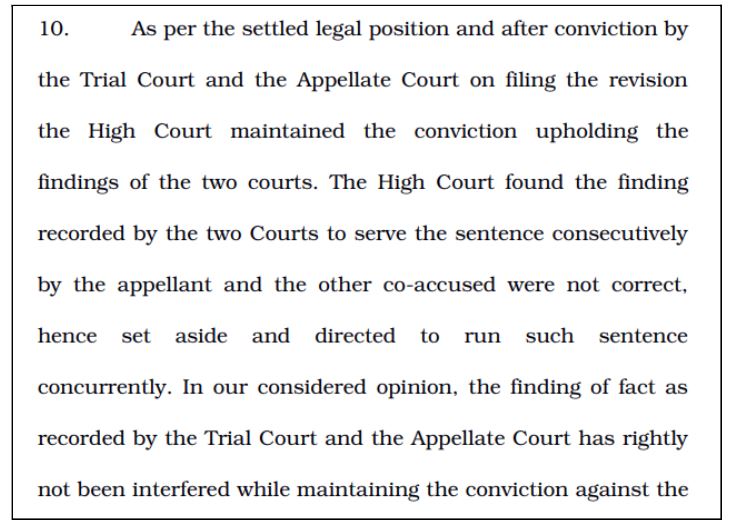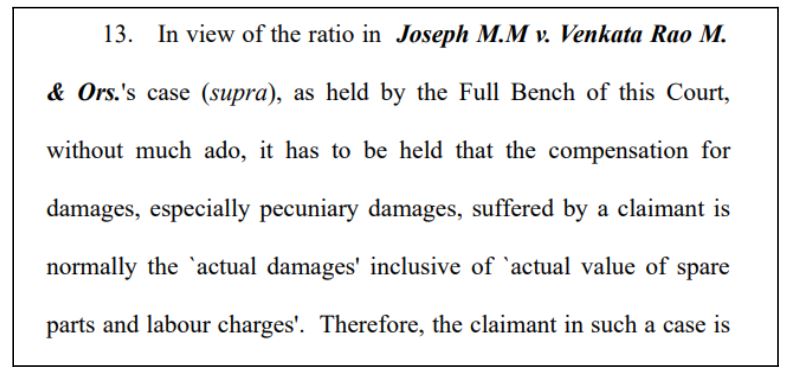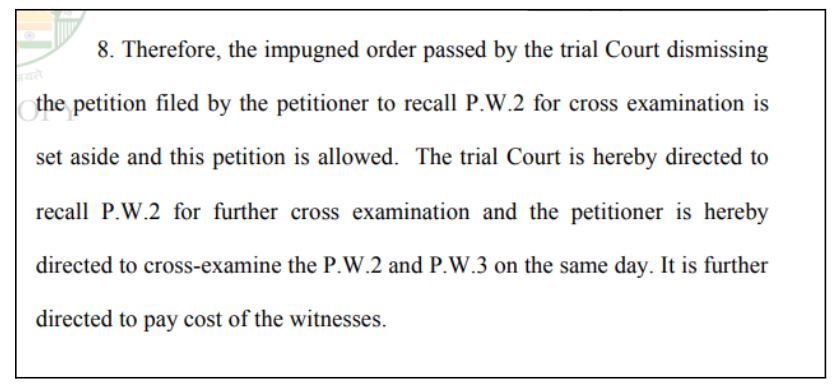In this week’s review of Court Judgments, we look at the Supreme Court’s observation that similarity in designation or quantum of work does not mean that the pay should be the same, that the trial and appellate courts have full discretion to order sentences to run concurrently, that electricity is a basic amenity of which a person cannot be deprived, Kerala HC’s order that value of spare parts should also be included in compensation for a motor accident.
SC: The trial and appellate courts have full discretion to order sentences to run concurrently
In Malkeet Singh Gill vs. State of Chhattisgarh, the Director and Area Manager (appellant) of a company is involved in collecting money by deposits and paying an annual interest to the depositors. Though receipts, passbooks, and ledgers were maintained, when the depositor asked for the return of deposits upon maturity along with interest, the Company denied it and closed. The complainant filed a case against the appellants for deceiving him and the public at large under the guise of wrong information, that the Company was recognized by the Reserve Bank of India (RBI). The Trial Court convicted the accused persons for the charges under Sections 409, 420, 409 read with 120B and 420 read with 120B of IPC. They were sentenced to undergo rigorous imprisonment of 4 years, 7 years, 1 year and 2 years respectively along with a fine and directed to serve the sentences one after the other. When the matter was taken to the High Court, it directed that the sentences so awarded shall run concurrently.
The appellant approached the Supreme Court stating that the charges for an offence under Sections 420 and 409 of IPC are antithetical to each other, and so he could not be convicted for both charges. He added that he was only an employee and was made a scapegoat for selective prosecution. The Supreme Court Bench of Justices Indira Banerjee and JK Maheshwari dismissed the appeal on grounds that there were concurrent findings of conviction arrived at by two Courts after detailed appreciation of the material and evidence brought on record. With respect to the sentence, the Bench noted that the High Court’s direction was in line with Section 31 of CrPC which gives full discretion to the Trial and Appellate Court to order sentences to run concurrently.

SC: Similarity in designation or quantum of work does not mean that the pay should be the same
In State of MP through Principal Secretary and Ors vs. Seema Sharma, Seema Sharma was appointed as Librarian-cum-Museum Assistant in Government Dhanvantri Ayurvedic College, Ujjain. She claimed the UGC scale of pay as paid to the persons in the senior scale of Librarian in colleges under the Higher Education Department after completing 8 years of service. However, her request was declined by the State Authorities. She then approached the High Court claiming the said relief under the Madhya Pradesh Education Service (Collegiate Branch), Recruitment Rules, 1990. The High Court considered her appeal and directed the authorities that she be paid the UGC scale of pay as paid to the Librarians of colleges under the Higher Education Department.
The authority approached the Supreme Court contending that the 1990 rules were not applicable to her as she was employed under the Ayush Department of the Government of Madhya Pradesh and not the Higher Education Department. Moreover, she was appointed under the Madhya Pradesh Public Health (Indian System of Medicine and Homeopathy), Class III, Clerical and Non-Clerical Services Recruitment Rules, 1987 and not the 1990 Rules.
The Supreme Court bench of Indira Banerjee and JK Maheshwari stated that the judgement on which the single and division bench of the High Court had relied on was not applicable in this case and referred to State of Madhya Pradesh & Ors. vs. Ramesh Chandra Bajpai, 2009 instead. In this case, the respondent had claimed for the UGC Pay Scale. However, the Court had held that the doctrine of equal pay for equal work could be invoked only when the employees were similarly circumstanced in every way. The mere similarity of designation or similarity or quantum of work was not determinative of equality in the matter of pay scales. Further, the mode of recruitment, qualifications for the post, the nature of work, etc. was to be considered. The SC Bench quashed the High Court’s order and allowed the State’s appeal.

SC: Electricity is a basic amenity of which a person cannot be deprived
In Dilip (D) vs. Satish, the tenants filed a petition under Section 17 of the Hyderabad Rent Control Act in the Court of the Rent Controller, Aurangabad, seeking directions from the landlord to provide electricity connection at the said shop. However, the petition got rejected since the shop was running on Petromax since its inception. Following this, the tenant applied for a supply of electricity in his own name based on a “No Objection” letter and got a supply of electricity to the said shop in his own name. However, the appellant filed an FIR that the letter was a fabricated one and signatures were forged. The High Court quashed the FIR noting that the tenant needed electricity for doing this business, but the landlord was not giving a ‘no objection certificate’. The High Court, in its order, stated that the landlord cannot prevent the tenant from availing of such a facility at his own cost. It added that the purpose should be considered first and then the definition of cheating. Moreover, it noted that the false record, if any created, had not caused any harm to the property of a person.
The landowner then approached the Supreme Court. The Supreme Court Bench comprising Justices Indira Banerjee and CT Ravikumar noted that electricity is a basic amenity of which a person cannot be deprived. Furthermore, it cannot be declined to a tenant just because the landlord does not issue a ‘no objection certificate’. The electricity supply authority must verify if the applicant for the connection is in occupation of the premises.
The Bench added that the High Court’s quashing of FIR was erroneous since it cannot be stated that forging/fabrication of documents is not an offence under IPC and allowed the appeal. It also ordered that the electricity supply was not to be discontinued provided they paid the electricity charges.

Kerala HC: Value of spare parts should also be included in compensation
In Thomas vs. R. Murugasamy, the appellant’s vehicle was damaged in an accident in 2009. The question considered by the Kerala High Court was if the reduction was permissible towards the value of spare parts incurred by the claimant on account of the repair of a vehicle damaged in a motor accident. In simpler words, whether the compensation of the insurance company should cover the value of spare parts incurred for repairing the vehicle which was damaged in the motor accident.
Justice Badharudeen who heard the case referred to old cases and stated that the claimant is entitled to compensation for the value of spare parts incurred for repairing the vehicle which was damaged in the motor accident. The order stated that the claimant is entitled to get compensation for actual damages inclusive of the value of spare parts as well and no deduction is liable to be made from the value of spare parts.

Madras HC: Section 33(5) of the POCSO Act gets diluted if the victim becomes a major
In Sankar vs. State in the Madras High Court, the Petitioner was charged for offences under Sections 366 (A) of IPC and Section 5(1), read with Section 6 of the POCSO Act. He filed an application under Section 311 CrPC to recall the victim and her mother to bring forward certain contradictions in their statements that could not be addressed at the time of cross-examination. The trial court allowed the recalling of the mother of the victim and at the same time dismissed the petition for recalling the victim to save her from further harassment.
When the matter was taken to the High Court, Justice V.Sivagnanam noted that the victim was now a major and that the case was filed by the victim’s father due to an alleged love affair between the petitioner and the victim. On these grounds, the order of the Trial Court was quashed and directed that the accused could cross-examine the victim and her mother on the same day so that the accused gets an opportunity to defend herself.

CCPA: Hotels and restaurants cannot levy service charges on consumers by default
According to the Central Consumer Protection Authority (CCPA)’s guidelines for preventing unfair trade practices and violation of consumer rights with regard to levying of service charges in hotels and restaurants, hotels or restaurants shall not add service charges automatically or by default in the food bill. Further, no hotel or restaurant can force a consumer to pay a service charge. It should clearly inform the consumer that the service charge is voluntary, optional and at the consumer’s discretion. There should be no restriction on entry or provision of services on the basis of service charge collection. The service charge shall not be collected by adding it along with the food bill and levying GST on the total amount.
If the guidelines are violated, one can lodge a complaint on the National Consumer Helpline (NCH), which works as an alternate dispute redressal mechanism at the pre-litigation level by calling 1915 or through the NCH mobile app. The consumer can also file a complaint against unfair trade practices with the Consumer Commission. The Complaint can also be filed electronically through the e-daakhil portal or a complaint can be submitted to the District Collector of the concerned district.
Featured Image: Review of Court Judgments


